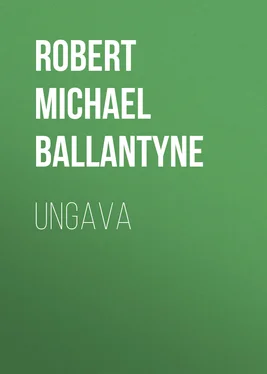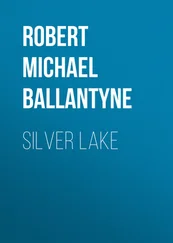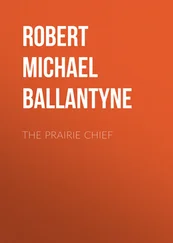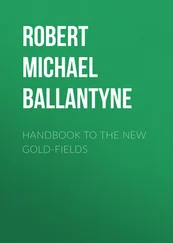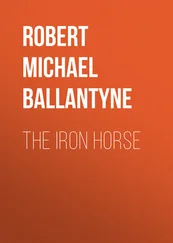Robert Michael Ballantyne - Ungava
Здесь есть возможность читать онлайн «Robert Michael Ballantyne - Ungava» — ознакомительный отрывок электронной книги совершенно бесплатно, а после прочтения отрывка купить полную версию. В некоторых случаях можно слушать аудио, скачать через торрент в формате fb2 и присутствует краткое содержание. Жанр: Детские приключения, literature_19, foreign_antique, foreign_prose, foreign_children, на английском языке. Описание произведения, (предисловие) а так же отзывы посетителей доступны на портале библиотеки ЛибКат.
- Название:Ungava
- Автор:
- Жанр:
- Год:неизвестен
- ISBN:нет данных
- Рейтинг книги:3 / 5. Голосов: 1
-
Избранное:Добавить в избранное
- Отзывы:
-
Ваша оценка:
- 60
- 1
- 2
- 3
- 4
- 5
Ungava: краткое содержание, описание и аннотация
Предлагаем к чтению аннотацию, описание, краткое содержание или предисловие (зависит от того, что написал сам автор книги «Ungava»). Если вы не нашли необходимую информацию о книге — напишите в комментариях, мы постараемся отыскать её.
Ungava — читать онлайн ознакомительный отрывок
Ниже представлен текст книги, разбитый по страницам. Система сохранения места последней прочитанной страницы, позволяет с удобством читать онлайн бесплатно книгу «Ungava», без необходимости каждый раз заново искать на чём Вы остановились. Поставьте закладку, и сможете в любой момент перейти на страницу, на которой закончили чтение.
Интервал:
Закладка:
“Ah, my darling! would that my lazy men were endued with some of your spirit,” said Stanley, patting the child’s head.
“Is Prince a lazy man, papa?” inquired Edith anxiously.
“No, certainly, Prince is not. Why do you ask?”
“Because I love Prince.”
“And do you not love all the men?”
“No,” replied Edith, with some hesitation; “at least I don’t love them very much, and I hate one.”
“Hate one!” echoed Mrs Stanley. “Come here, my darling.”
Eda slipped from her father’s knee and went to her mother, feeling and looking as if she had said something wrong.
Mrs Stanley was not one of those mothers who, whenever they hear of their children having done anything wrong, assume a look of intense, solemnised horror, that would lead an ignorant spectator to suppose that intelligence had just been received of some sudden and appalling catastrophe. She knew that children could not be deceived by such pieces of acting. She expressed on her countenance precisely what she felt—a slight degree of sorrow that her child should cherish an evil passion, which, she knew, existed in her heart in common with all the human race, but which she expected, by God’s help and blessing, to subdue effectually at last. Kissing Eda’s forehead she said kindly,—“Which of them do you hate, darling?”
“Gaspard,” replied the child.
“And why do you hate him?”
“Because he struck my dog,” said Eda, while her face flushed and her eyes sparkled; “and he is always rude to everybody, and very, very cruel to the dogs.”
“That is very wrong of Gaspard; but, dearest Eda, do you not remember what is written in God’s Word,—‘Love your enemies?’ It is wrong to hate anybody.”
“I know that, mamma, and I don’t wish to hate Gaspard, but I can’t help it. I wish if I didn’t hate him, but it won’t go away.”
“Well, my pet,” replied Mrs Stanley, pressing the child to her bosom, “but you must pray for him, and speak kindly to him when you meet him, and that will perhaps put it away. And now let us talk of the far-off country that papa was speaking about. I wonder what he has to tell you about it.”
Stanley had been gazing out of the window during the foregoing colloquy, apparently inattentive, though, in reality, deeply interested in what was said. Turning round, he said—
“I was going to tell Eda that you had arranged to follow me to that country next year, and that perhaps you would bring her along with you.”
“Nay, George, you mistake. I did not arrange to do so—you only proposed the arrangement; but, to say truth, I don’t like it, and I can’t make up my mind to let you go without us. I cannot wait till next year.”
“Well, well, Jessie, I have exhausted all my powers of persuasion. I leave it entirely to yourself to do as you think best.”
At this moment the sound of deep voices was heard in the hall, which was separated from Stanley’s quarters by a thin partition of wood. In a few seconds the door opened, and George Barney, the Irish butler and general factotum to the establishment, announced that the “min wos in the hall awaitin’.”
Giving Eda a parting kiss, Stanley rose and entered the hall, where François, Massan, Gaspard, and several others were grouped in a corner. On their bourgeois entering, they doffed their bonnets and bowed.
“Well, lads,” began Stanley, with a smile, “you’ve thought better of it, I hope, and have come to volunteer for this expedition—” He checked himself and frowned, for he saw by their looks that they had come with quite a different intention. “What have you to say to me?” he continued abruptly.
The men looked uneasily at each other, and then fixed their eyes on François, who was evidently expected to be spokesman.
“Come, François, speak out,” said Stanley; “if you have any objections, out with them; you’re free to say what you please here.”
As he spoke, and ere François could reply, Frank Morton entered the room. “Ah!” he exclaimed, as he deposited his rifle in a corner and flung his cap on the table, “in time, I see, to help at the council!”
“I was just asking François to state his objections to going,” said Stanley, as his young friend took his place beside him.
“Objections!” repeated Frank; “what objections can bold spirits have to go on a bold adventure? The question should have been, ‘Who will be first to volunteer?’”
At this moment the door of Stanley’s apartment opened, and his wife appeared leading Eda by the hand.
“Here are two volunteers,” she said, with a smile; “pray put us at the head of your list. We will go with you to any part of the world!”
“Bravo!” shouted Frank, catching up Eda, with whom he was a great favourite, and hugging her tightly in his arms.
“Nay, but, wife, this is sheer folly. You know not the dangers that await you—”
“Perhaps not,” interrupted Mrs Stanley; “but you know them, and that is enough for me.”
“Indeed, Jessie, I know them not. I can but guess at them.—But, ah! well, ’tis useless to argue further. Be it so; we shall head the list with you and Eda.”
“And put my name next,” said a deep-toned voice from behind the other men. All turned round in surprise.
“Dick Prince!” they exclaimed; “you here?”
“Ay, lads,” said a tall man of about forty, who was not so remarkable for physical development (though in this respect he was by no means deficient) as for a certain decision of character that betrayed itself in every outline of his masculine, intelligent countenance—“ay, lads, I’m here; an’ sorry am I that I’ve jist comed in time to hear that you’re sich poor-spirited rascals as to hang back when ye should jump for’ard.”
“But how came you so opportunely, Prince?” inquired Stanley.
“I met an Injin, sir, as told me you was goin’ off; so I thought you might want me, and comed straight back. And now, sir, I’m ready to go; and so is François,” he continued, turning to that individual, who seized his hand and exclaimed, “That am I, my boy—to the moon if ye like!”
“And Massan, too,” continued Prince.
“All right; book me for Nova Zembla,” replied that worthy.
“So, so,” cried Mr Stanley, with a satisfied smile. “I see, lads, that we’re all of one mind now. Is it not so? Are we agreed?”
“Agreed! agreed!” they replied with one voice.
“That’s well,” he continued. “Now then, lads, clear out and get your kits ready.—And ho! Barney, give these men a glass of grog.—Prince, I shall want to talk with you this evening. Come to me an hour hence.—And now,” he added, taking Eda by the hand, “come along, my gentle volunteers; let’s go to supper.”
Chapter Four.
Explanatory, but not dry!—Murderous designs thwarted by vigorous treatment—The cattle pay for it!—Preparations for a long, long voyage
In order to render our story intelligible, it is necessary here to say a few words explanatory of the nature and object of the expedition referred to in the foregoing chapters.
Many years previous to the opening of our tale, it was deemed expedient, by the rulers of the Hudson’s Bay Fur Company, to effect, if possible, a reconciliation or treaty of peace between the Muskigon Indians of James’s Bay and the Esquimaux of Hudson’s Straits. The Muskigons are by no means a warlike race; on the contrary, they are naturally timid, and only plucked up courage to make war on their northern neighbours in consequence of these poor people being destitute of firearms, while themselves were supplied with guns and ammunition by the fur-traders. The Esquimaux, however, are much superior to the Muskigon Indians physically, and would have held their adversaries in light esteem had they met on equal terms, or, indeed, on any terms at all; but the evil was that they never met. The Indians always took them by surprise, and from behind the rocks and bushes sent destruction into their camps with the deadly bullet; while their helpless foes could only reply with the comparatively harmless arrow and spear. Thus the war was in fact an annual raid of murderers. The conceited Muskigons returned to their wigwams in triumph, with bloody scalps hanging at their belts; while the Esquimaux pushed farther into their ice-bound fastnesses, and told their comrades, with lowering brows and heaving bosoms, of the sudden attack, and of the wives and children who had been butchered in cold blood, or led captive to the tents of the cowardly red men.
Читать дальшеИнтервал:
Закладка:
Похожие книги на «Ungava»
Представляем Вашему вниманию похожие книги на «Ungava» списком для выбора. Мы отобрали схожую по названию и смыслу литературу в надежде предоставить читателям больше вариантов отыскать новые, интересные, ещё непрочитанные произведения.
Обсуждение, отзывы о книге «Ungava» и просто собственные мнения читателей. Оставьте ваши комментарии, напишите, что Вы думаете о произведении, его смысле или главных героях. Укажите что конкретно понравилось, а что нет, и почему Вы так считаете.
